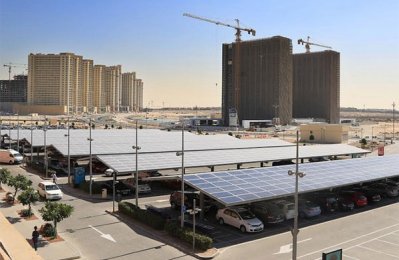Majid Al Futtaim, a leading shopping mall leisure pioneer, has achieved 97% of the targets set out in its annual sustainability strategy, demonstrating the company’s dedication to driving the sustainability agenda forward in the region.
The company has released its 2020 Sustainability Report, highlighting key milestones and initiatives launched throughout the year.
The audited results showcase Majid Al Futtaim’s progress towards its Net Positive commitment, as 2020 saw the company record a 9.2% decrease in its carbon footprint and a 17.5% decrease in water usage across its operations. It also generated nearly 17 million kWh of renewable energy last year, with 63% generated through its shopping malls alone - enough to power an electric car for 85 million kilometres, or the equivalent to driving over 40,000 times from Dubai to Riyadh and back.
Other important milestones included the launch of Majid Al Futtaim’s circular economy strategy focusing on tackling waste and moving towards a more circular business model by 2030, as well as the launch of its Responsible Procurement Policy developed to reduce business risks and to drive positive change within the company’s supply chain, with minimum sustainability standards set out for suppliers.
Ibrahim Al-Zu’bi, Chief Sustainability Officer, Majid Al Futtaim - Holding, commented on the report: “The past 12 months have seen our world change beyond imagination and the importance of taking care of one another and the planet has never been clearer. Our sustainability strategy has been a top priority for the business and achieving 97% of our targets demonstrates the importance we place on driving the sustainability agenda forwards within our own operations and across the region as whole.”
“The launch of our circular economy strategy, which looks to tackle waste within the business and move towards a more circular business model by 2030, was a key 2020 milestone for us. Now, as we enter the final stretch before reaching our 2022 Sustainable Business Commitments, we will continue to future proof our business, scaling up on our Net Positive efforts and embedding climate-related risk management to ensure our business resilience and reduce our impact on the environment,” Al-Zu’bi added.
As restrictions to prevent the spread of the virus came into place, Majid Al Futtaim’s main priority was the wellbeing and safety of its employees, whether they were working remotely or continuing to work at its assets. To this end, besides implementing the highest standards of health and safety, the company launched several initiatives, such as virtual webinars to help employees deal with Covid-19 anxiety, and its first ever virtual Wellness Week, which saw the engagement of 20,000 employees across the business.
During the malls’ closures, the company reskilled over 1,000 of its leisure, entertainment and cinema employees and redeployed them to support the increased demand in its Carrefour business. In 2020, Majid Al Futtaim also doubled down on its Leadership Institute efforts and launched a sustainability e-learning module to over 9,250of the group’s office-based employees across 17 countries.
Despite the challenges of Covid-19, and in line with its vision to create great moments for everyone, everyday, Majid Al Futtaim also hosted the Mena region’s first ever carbon-neutral movie screening at VOX Cinemas, in collaboration with the UAE Ministry of Climate Change and Environment to mark World Environment Day 2020. Since then, its continued partnership with Dubai Carbon Centre of Excellence ensures that all screenings held at the VOX Cinemas’ Drive-In are carbon neutral and in its first three months, the partnership offset 19.32 tCO2e for a total of 1,400 cars.
Also reinforcing its commitment to developing and operating sustainable buildings, Majid Al Futtaim achieved success by leading its 13-property hotel portfolio to become the only group in the world to receive LEED Platinum certification. In addition, highlighting its support to Dubai’s strategic objectives in Health, Wellbeing, Happiness, Sustainability and Smart Cities, the company’s flagship mixed-use community in Dubai, Tilal Al Ghaf, has been designed with circular economy principles and developed to become a global benchmark which will be the first BREEAM certified community in Dubai.
As a partner of the UAE’s 20by2020 initiative, which provides sustainability solutions and technologies to last-mile and off grid communities, Majid Al Futtaim also funded two critical projects to help 6,500 people gain reliable and renewable access to energy through the installation of solar streetlights in Jordan and Egypt. In Jordan, solar streetlights were installed in and around a hospital crucial for the country’s Covid-19 response, improving site safety and reducing upkeep costs.
Collaboration and partnerships also played a crucial role within Majid Al Futtaim’s 2020 sustainability strategy. Carrefour Kenya worked with a local partner to recycle paper, plastic, metal, and organic waste. The partnership saw 92% of operational waste being recycled and over the year offset 581,221 kg of CO2 emissions, the equivalent to saving a forest area the size of 810 football pitches. Carrefour Uzbekistan was the first retail store in the country to introduce and transition to eco bags, paper and reusable bags over plastics, and Carrefour Bahrain made the decision to deliver all orders made through the Carrefour app in reusable bags at no additional cost.
Looking to the future, the company will continue to invest in critical tools and infrastructure, including renewable energy and water efficiency and reuse technology, in a bid to realise its first carbon and water reduction targets in 2022, and the eventual achievement of its 2040 Net Positive commitment.
Majid Al Futtaim has been one of the first three signatories to the World Green Building Council’s Net Zero Carbon Buildings Commitment that states buildings must be net zero carbon in operation by 2050, and with the aim to support to the global agenda, the company looks to set Science Based Targets (SBTs), which will ensure its emissions-reduction targets are aligned with the latest science on what is needed to reach the goals of the Paris Climate Agreement. – TradeArabia News Service
Majid Al Futtaim delivers 97% of 2020 sustainable goals


&uuid=(email))